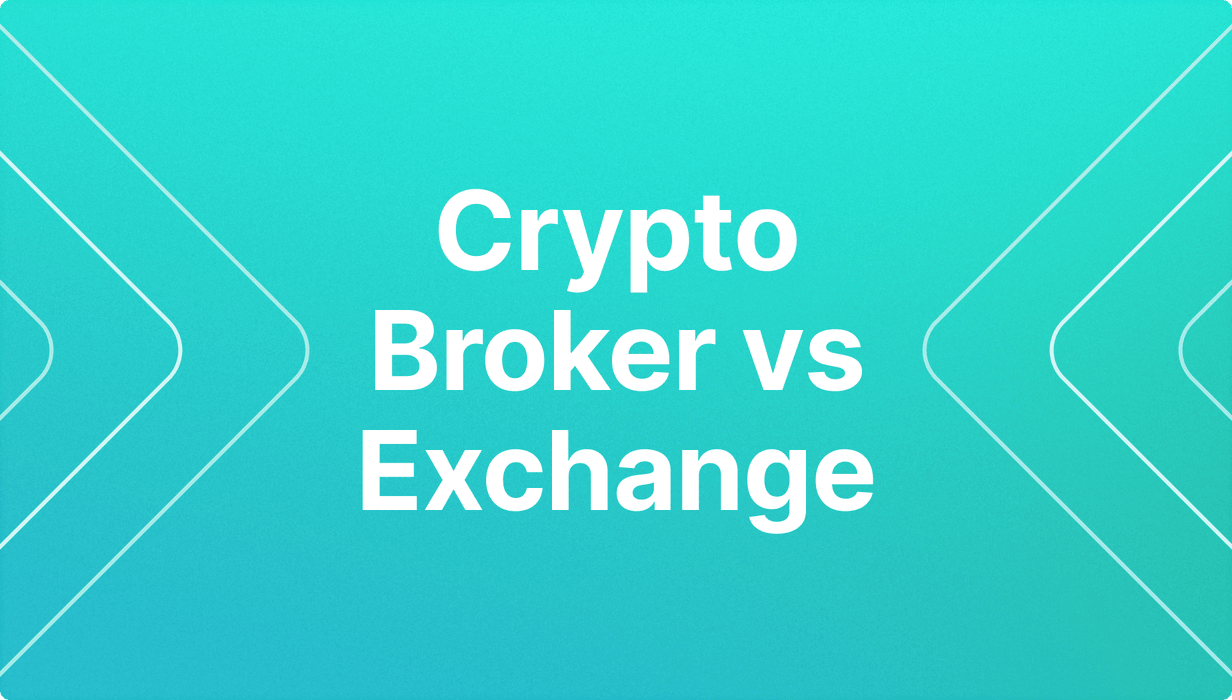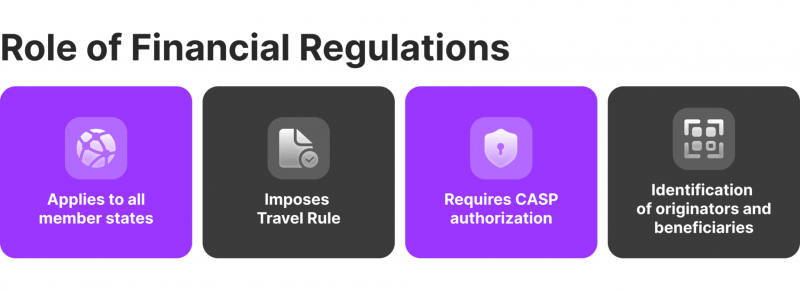بورصة العملات المشفرة مقابل الوساطة: كيفية البدء بكل منهما

لقد فتح وجود العملات المشفرة والاقتصاد اللامركزي العديد من البوابات أمام الشركات التي ترغب في الاستفادة من الاتجاهات المتزايدة في التمويل اللامركزي، وتداول العملات المشفرة، وتسهيل عمليات التبادل من نظير إلى نظير.
ظهر العديد من مقدمي الخدمات استنادًا إلى عملة البيتكوين والعملات الافتراضية الأخرى، سواء لإنشاء برامج تداول العملات المشفرة، أو تسهيل بوابات الدفع، أو تخزين الأموال الافتراضية.
هناك أموال يمكن الاستيلاء عليها في العملات المشفرة. ومع ذلك، فأنت بحاجة إلى العثور على نموذج العمل المناسب الذي يناسبك، سواء كنت ترغب في بدء منصة لتبادل العملات المشفرة أو تشغيل شركة وساطة لتداول العملات المشفرة. دعونا نناقش إطلاق بورصة العملات المشفرة مقابل شركة وساطة مالية.
النقاط الرئيسية
- يعد وسطاء وبورصات العملات المشفرة طريقتين لبدء عمل تجاري يعتمد على نمو العملات الافتراضية وزيادة المستثمرين.
- تعمل البورصات اللامركزية على تسهيل التداول المباشر للعملات المشفرة بين المستخدمين بشكل أسرع وبرسوم أقل.
- تشمل منصات الوساطة خيارات تداول متنوعة وخدمات وساطة تناسب المستثمرين المؤسسيين والتجار.
- يمكن لمنصات الوساطة وايت ليبل أن تعزز أعمالك من خلال الوصول إلى السوق بشكل أسرع والخبرة العملية.
بورصة العملات المشفرة مقابل الوسيط: الفرق
تعد بورصات العملات المشفرة والوساطة نموذجين للأعمال يستفيدان من الاتجاهات المتنامية في الاقتصادات اللامركزية، بما في ذلك العملات المشفرة والتطبيقات اللامركزية والمنصات القائمة على تقنية blockchain.
تتحول الشركات المالية والشركات الناشئة إلى العملات المشفرة، أو على الأقل تضيف أجزاء منها، لتوسيع حزمة خدماتها واغتنام الفرص المزدهرة في هذه الصناعة.
مع تقلبات السوق وارتفاع الأسعار، يصبح المستثمرون أكثر رغبة في شراء العملات المشفرة والاحتفاظ بها، وخاصة العملات المشفرة الأعلى نموًا مثل Bitcoin وEthereum. ولذلك، فإن بدء عمل تجاري خدمي في هذا المجال هو الطريقة الصحيحة لتوليد الدخل من خلال كسب رسوم العمولة، وتقديم خدمات الوساطة، والتداول ضد المشاركين في السوق، ونماذج الأعمال الأخرى.

ولكن ما هي أفضل طريقة لاختراق هذا السوق؟ ما الفرق بين وسيط العملات المشفرة والبورصة؟ وسوف نقوم بتغطية هذه المفاهيم في ما يلي.
بورصات العملات المشفرة
بورصات العملات المشفرة هي منصات تعمل على تسهيل تبادل العملات الافتراضية وشرائها وبيعها بين المستخدمين. إنها طريقة شائعة للدخول إلى سوق العملات المشفرة وامتلاك الcoins و tokens الأولى.
يتيح برنامج تبادل العملات المشفرة للمتداولين استخدام عملاتهم الافتراضية أو الورقية الحالية واستبدالها بأصول رقمية أخرى مع مستخدم آخر على نفس المنصة.
يوجد عدد كبير من المستخدمين في أفضل بورصات العملات المشفرة مثل Binance وCoinbase وGemini. لذلك، تتمتع هذه المنصات بسيولة كبيرة ومجموعة واسعة من الأصول المشفرة. تدعم بعض البورصات العملات الورقية، حيث يمكن للمستخدمين استخدام الدولار الأمريكي أو اليورو لشراء العملات المشفرة وتخزينها في محفظتهم المخصصة.

مزايا شركات تداول العملات المشفرة
إن إطلاق شركة كمنصة تداول لامركزية يمكن أن يكون مربحاً للغاية ، حيث تحصل على حصة من كل عملية تداول تمت معالجتها بين المستخدمين. في معظم الحالات، تتكبد خدمات الصرف نسبة مئوية من كل صفقة، وتحقق عوائد كبيرة عند تنفيذ أوامر كبيرة.
هل لديك سؤال حول إعداد الوسيط الخاص بك؟
فريقنا هنا لمساعدتك — سواء كنت تبدأ من الصفر أو توسّع عملك.
في الآونة الأخيرة، تحول المستخدمون بشكل متزايد إلى منصات التبادل الفوري للعملات المشفرة، حيث يمكنهم شراء وبيع العملات المشفرة المختلفة بأسعار مناسبة، وتكاليف أقل، وأوقات معالجة أسرع.
توفر DEXes أيضًا العديد من الاستثمارات القائمة على blockchain، مثل staking, liquidity farming and NFT أسواق.
فهم وسطاء العملات المشفرة
يعمل وسيط العملات المشفرة مثل أي شركة وساطة، حيث يوفر جسرًا للأسواق المالية ويسمح للمستخدمين بتنفيذ الأوامر وكسب المال.
عادة ما تكون أكثر تعقيدًا من منصات تداول العملات المشفرة من نظير إلى نظير لأنها تتضمن الترخيص من السلطات المالية والامتثال القانوني وأنظمة الدفع وخدمات التداول.
علاوة على ذلك، يمكن للمتداولين على منصات الوساطة الاستفادة من مجموعة واسعة من أدوات التحليل والمؤشرات والرسوم البيانية لاتخاذ القرار الاستثماري الصحيح. يمكن للمستثمرين أيضًا استخدام خدمات الوساطة الإضافية، مثل تداول عقود الفروقات، حسابات PAMM وMAM المُدارة، والتداول بالرافعة المالية.

مزايا شركة الوساطة في العملات المشفرة
قد تبدو شركات وساطة العملات المشفرة مشابهة للبورصات، حيث يمكن للمستخدمين الحصول على العملات المشفرة وتخزينها في حساباتهم. ومع ذلك، هناك بعض الاختلافات التي يمكن أن تكون مناسبة للمبتدأين في مجال العملات المشفرة الذين يتطلعون إلى تحقيق مكاسب من الاستثمار في الأسواق اللامركزية.
توفر هذه المنصات نظامًا أكثر تطورًا لأدوات التداول وخدمات الوساطة وحلول الاستثمار. من ناحية أخرى، يعد امتلاك موقع وساطة العملات المشفرة الخاص بك طريقة رائعة لكسب المال من الطلب المتزايد على BTC وETH والعملات الرئيسية.
باعتبارك وسيط عملات مشفرة، فإنك توفر إمكانية الوصول إلى أسواق التداول وربط منصتك بمصادر السيولة لتوفير أفضل شروط التداول عبر العديد من العملات المشفرة. وفي المقابل، تحصل على عمولة من كل صفقة يتم تنفيذها، إلى جانب الرسوم الأخرى من خدمات التداول الأخرى التي قد تقدمها.
البيئة التنظيمية للعملات المشفرة
هناك حالة ديناميكية عندما يتعلق الأمر بتنظيم العملات المشفرة، والتي تتغير جنبًا إلى جنب مع أحداث السوق والإصلاحات المالية. على سبيل المثال، اعتمدت بعض البلدان BTC كدفتر أستاذ قانوني، في حين ضاعفت الهيئات التنظيمية الأمريكية جهودها في بورصة العملات المشفرة وشركات الوساطة المالية.

تطلب هيئة الأوراق المالية والبورصة الأمريكية من وسطاء العملات المشفرة ومنصات التبادل أن يكونوا مسجلين لدى الهيئة الوطنية، خاصة عندما يتعلق الأمر بتقديم الأوراق المالية.
بالإضافة إلى ذلك، تحاول هيئة الأوراق المالية والبورصات تنظيم تداول البيتكوين والعملات الرئيسية الأخرى كأوراق مالية مسجلة تساهم في الاقتصاد وتدير التقلبات الهائلة المرتبطة بالأصول اللامركزية.
ونتيجةً لذلك، لا يتم تسجيل بورصات العملات المشفرة ووسطاء التداول في السجل الفيدرالي الأمريكي. ومع ذلك، يتم الالتزام بها بصرامة ويمكن أن تواجه غرامات باهظة في حالة حدوث سوء سلوك.
في عام 2023، رفعت هيئة الأوراق المالية والبورصات دعوى قضائية ضد Binance لتقديمها أوراقًا مالية غير منظمة، مما أدى إلى تسوية مبلغ 4.3 مليار دولار دفعته شركة البورصة.
وفي الوقت نفسه، وافقت الهيئة التنظيمية الأمريكية على إدراج صندوق البيتكوين المتداول في البورصة بعد طلب طال انتظاره من قبل شركات مالية رائدة، مثل BlackRock وFidelity Investments. وقد حفزت هذه الخطوة اهتمام المستثمرين وثقتهم في امتلاك وتداول البيتكوين والإيثريوم.
في أوروبا، يتم تسجيل شركات العملات المشفرة الكبرى، مثل البورصات ومنصات الوساطة، وتعمل ضمن ولايات قضائية قانونية، مثل ترخيص MiFID II في أوروبا وFCA في المملكة المتحدة.
كيفية إطلاق مشروع تجاري: وسيط العملات المشفرة مقابل البورصة
إذا كنت تفكر في كسب المال كوسيط في سوق العملات المشفرة، فيجب أن يكون إطلاق منصة تداول العملات المشفرة على رأس أولوياتك. يعتمد الاختيار بينهما على مستوى التنظيم والرخصةالذي تهدف إلى الحصول عليه والخدمات التي ترغب في تقديمها.
تشغيل منصة تداول العملات المشفرة P2P
تتطلب منصة التداول اللامركزية معرفة وخبرة برمجية متطورة لإنشاء برامج مطابقة الطلبات، وتكوين معايير تنفيذ المعاملات، والعمل على سلاسل وشبكات متعددة.
احصل على أدوات تدعم أكثر من 500 شركة وساطة
استكشف منظومتنا الكاملة — من السيولة إلى إدارة علاقات العملاء وصولًا إلى بنية التداول التحتية.
ومع ذلك، يمكنك استخدام خدمة تطوير بورصة العملات المشفرة وايت ليبل، والتي توفر لك الوقت والمال اللازمين للإنشاء من الصفر. يمكن تحسين هذه الحلول الجاهزة لتناسب احتياجات عملك، مما يسمح لك بضبط النظام الأساسي الخاص بك على النحو التالي:
- قم بتوصيل برامج البورصة الخاصة بك بمزودي السيولة والمصادر التي تملأ منصة التداول p2p الخاصة بك.
- قم بإعداد محرك مطابقة لتنفيذ الأوامر من خلال البحث عن الطرف المقابل لكل معاملة يتم تنفيذها.
- تأكد من وجود نظام أمان على أعلى مستوى من خلال دعم سلاسل الكتل الموثوقة والمحافظ وأفضل بروتوكولات KYC وAML.
إنشاء سوفت ويير البورصة
من ناحية أخرى، توفر منصة الوساطة مجموعة واسعة من خيارات التداول، مثل الحسابات النقدية وحسابات الهامش، واستراتيجيات التداول المُدارة، ونسخ التداول، وخدمات الوساطة الأخرى. وتتم مراقبة هؤلاء المشغلين بشكل صارم من قبل الهيئات التنظيمية المركزية.
لذلك، فإن الخطوة الأولى التي يتعين عليك القيام بها هي دراسة البيئة القانونية في بلدك أو الاختصاص القضائي لشركتك. بمجرد الانتهاء من حل الجوانب القانونية، إليك كيفية البدء.
- قم بإعداد خطة عملك للسنوات القادمة. تعتبر هذه الخطوة حاسمة للترخيص في بعض البلدان ولجذب المشاريع الاستثمارية لدعم موقع الويب الخاص بك.
- اعتماد بنية تحتية أمنية رفيعة المستوى، بما في ذلك موفري خدمة اعرف عميلك (KYC)، ومراقبة مكافحة غسل الأموال (AML)، وموفري أنظمة الدفع.
- ابحث عن مصادر سيولة موثوقة ل إمداد منصتك مع العديد من الأوراق المالية التجارية، مثل Prime of Primes، التي تربط منصتك بمجموعات ومصادر استثمارية متعددة من المستوى الأول.
- أضف بوابة قبول دفع بالعملات المشفرة لبدء قبول المدفوعات بعملة BTC، وETH، والعملات الافتراضية الأخرى، والأموال الورقية.
- دعم مجموعة واسعة من أنظمة التداول، مثل نسخ التداول وحسابات PAMM وMAM والمكونات الإضافية للتداول.
الاستنتاج
يعد إطلاق منصة تداول في مجال العملات المشفرة طريقة ذكية للاستفادة من نمو هذه العملات والعدد المتزايد لحاملي العملات المشفرة والمتداولين. ومع ذلك، يواجه معظم رواد الأعمال التحدي المتمثل في العثور على نموذج العمل الصحيح:بورصة العملات المشفرة مقابل شركة الوساطة.
كل منصة لها إيجابيات وسلبيات، والتي تختلف بناءً على أهدافك. تعد البورصة مناسبة إذا كنت تهدف إلى تقديم وسيلة للتبادل المباشر بين المستخدمين لشراء وبيع العملات المشفرة.
ومع ذلك، إذا كنت ترغب في العمل كوسيط وتاجر متكامل، فإن نظام وساطة العملات المشفرة هو الأفضل بالنسبة لك الاستفادة من مجموعة واسعة من خيارات التداول وحلول الدفع واستراتيجيات الربح لتنمية أعمالك وتوسيع نطاقها.







